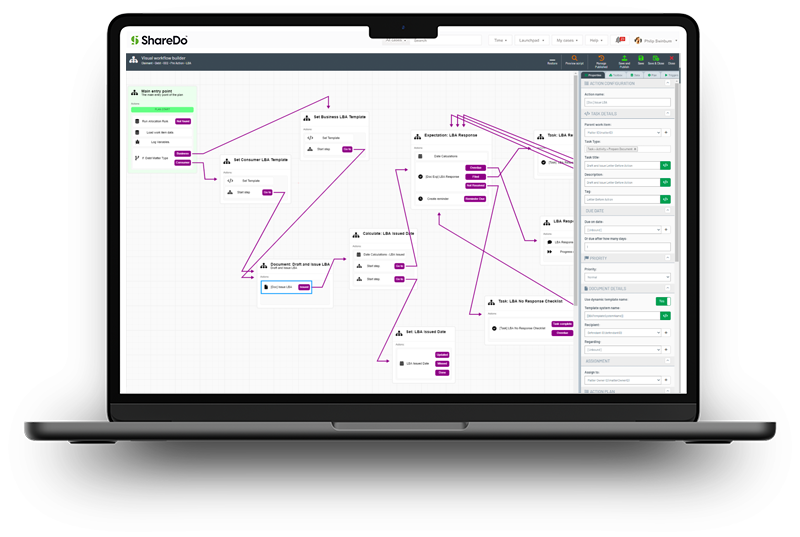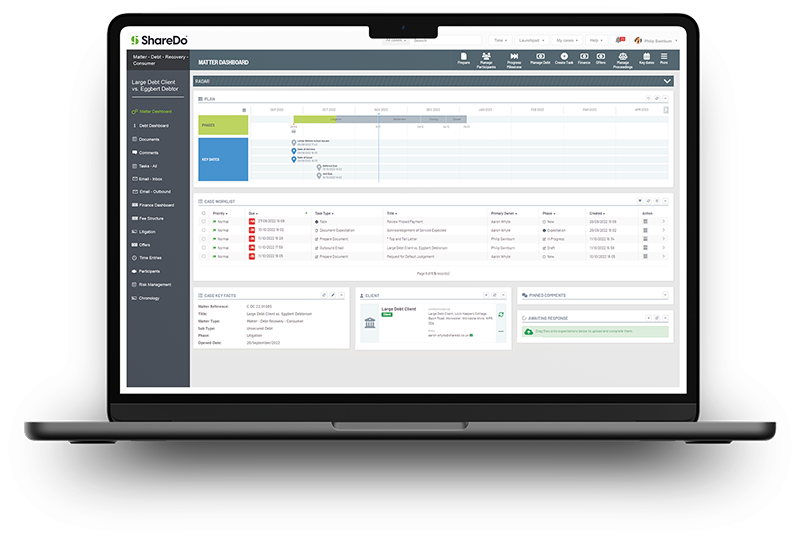Seven benefits of low code case management platforms
Low-code case management platforms give lawyers the tools to build processes, workflows, automation and client portals that would otherwise require traditional software development and programming.
These platforms provide friendly interfaces that enable non-technical people to build complex outputs via configurable pre-sets, drag-and-drop visual design canvases and other similarly easy-to-configure interfaces.
Here’s our top seven ways in which low-code case management platforms such as ShareDo can make law firms more agile, efficient and competitive.

1. Speed
Let’s start with the most obvious benefit you’ll positively feel when using low-code platforms. With all of the functionality heavy-lifting taken care of for you, you’ll be able turn your projects from idea to reality within a fraction of the time.
Without the need for complex and time-consuming coding, fast really means fast. Studies from the likes of Redhat found that low-code platforms help reduce project development times by 90%.
It goes without saying that time to market offers a huge competitive advantage for law firms.
Read how Zego Insurance went live with their new FNOL solution within just six weeks using Sharedo.
2. Easy to maintain
Your legal case management system will need to continually evolve in-line with your ever-changing business processes and client needs.
With low and no-code platforms such as ShareDo, making these enhancements becomes easier and quicker, with little or no requirement for in-house programming skills.
Not only that, but the ShareDo platform is being continually enhanced to make that process even easier.
3. Adaptability to pivot
ShareDo’s low-code approach means it’s easier and quicker to update your processes to meet changing client needs. For example, its Visual Workflow Builder allows law firms to dynamically build and adapt processes to quickly meet ever-changing requirements.
Again, low-code platforms provide subject-matter experts complete control to do this themselves, making pivoting to client and market changes much less of a headache than it used to be.

4. People power – you don't have to bring an army to every project
Gone are the days when you need to assemble an army of people to implement new projects and innovations.
No-code features mean that platforms like ShareDo can empower small dynamic teams to create things like client portals or new workflows.
This means your in-house IT experts can turn their attention to other important tasks instead.
5. Collaboration
Document collaboration, knowledge sharing, milestone visibility and shared work portfolios are just some of the ways that ShareDo allows your teams of lawyers to seamlessly work together.
Low-code platforms give the opportunity to effect massively positive organisational change – a topic we explored at this year's British Legal Technology Forum.
6. An incubator for innovation
We’ve already established that you don’t need to be a programmer to achieve most of your law firms needs with low-code platforms.
Now that your teams can build things that previously took a lot of time and additional resources to make happen, we’ve found this creates a stronger culture of innovation.
The reduced time and attention on coding makes space for a greater focus on building solutions to address key problems. When your platform empowers individuals to own more is when innovation truly flourishes.

7. Save time and money
Little to no-code means a lot less budget allocation to in-house software development, much of which was often just to maintain the status quo with your systems.
When adopting a single platform like ShareDo, law firms also reap cost savings through the reduction of multiple licenses and subscriptions.
But possibly the greatest cost savings of all comes from the countless daily efficiencies your people benefit from when using no-code platforms. Automating repetitive tasks, standardising workflows and processes and self-serve functionality can significantly boost your ‘lawyering’ capacity.
Law firms using ShareDo free up budget and time so that they can do – and bill – more than in the pre-no-code era.





